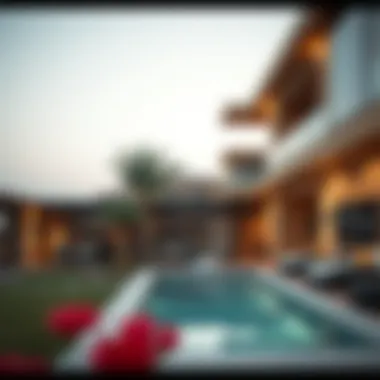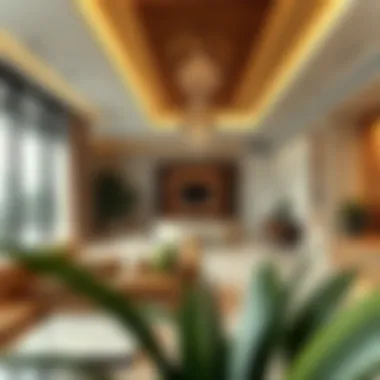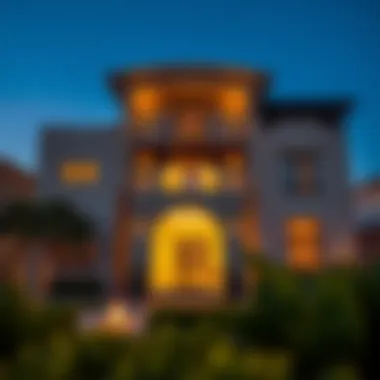Exploring Better Homes in Dubai: An In-Depth Analysis


Intro
Dubai offers a canvas of bespoke living experiences, from luxurious villas to towering apartments. The residential scene is always in flux, with unique developments springing up across the city, all promising a slice of paradise in the desert. The process of finding an ideal home here can feel akin to navigating a labyrinth for many potential buyers and investors. By breaking down the housing landscape, this article aims to illuminate your path through Dubai's intricate market.
No doubt, Dubai's real estate can be overwhelmingly opulent, yet it is also rich with opportunity. To make sense of it all, we will delve into the current property trends, emerging neighborhoods, and viable investment opportunities. With the right insights, all types of buyers—from families seeking that perfect neighborhood where their children can thrive to savvy investors looking for high returns—can find a home that aligns with their aspirations.
Let’s start with key trends shaping the property landscape.
Property Trends in Dubai
Emerging Neighborhoods and Hotspots
In recent years, several neighborhoods have risen to prominence, drawing home seekers and investors alike. Each area has its unique appeal, whether it's proximity to business districts, recreational amenities, or cultural experiences. Here’s a snapshot of some up-and-coming neighborhoods worth considering:
- Business Bay: This central area is not just about grand skyscrapers; it’s a hub of lifestyle options, featuring waterfront views and upscale dining.
- Dubai Marina: Emerging as a favorite, the Marina offers waterfront living, vibrant nightlife, and a cosmopolitan vibe that appeals to a diverse crowd.
- Jumeirah Village Circle (JVC): Designed for both residential and commercial use, JVC is seeing a surge in demand due to affordable options and community appeal.
- Dubai Hills Estate: This master-planned community marries nature with luxury, marking it a top choice for families looking to balance serenity and convenience.
These neighborhoods aren't just places to live; they embody a lifestyle transformation reflecting modern-day aspirations. Each offers something unique and captivating.
Market Analysis and Future Predictions
The Dubai real estate market has a reputation for being volatile. Various factors, including global economic trends, tourism influx, and regulatory changes, play pivotal roles in shaping market dynamics. However, experts predict a strong recovery trajectory, especially post-pandemic. Key indicators suggest a steady rise in property values, with foreseeing a demand shift toward more spacious homes, incorporating work-from-home capabilities.
Market analysts indicate that the following are crucial for potential buyers:
- Increased investment in infrastructure, highlighting government commitments to development.
- Growing tourism trends, as Expo 2020 has rejuvenated interest in property investments.
Property prices are expected to stabilize as supply adjusts to meet demand, creating a more balanced market for buyers. Emerging trends, particularly in luxury apartments and townhouses, have begun to show resilience, hinting at a promising future.
Investment Opportunities
High-ROI Property Types
Investors seeking significant returns should focus on specific property types that currently show high return rates. Gauge local performance and trends as you consider:
- Luxury Apartments in Central Areas: These command high rent yields and are continually in demand.
- Vacation Rentals: Holiday homes in prime areas attract both short-term and long-term tenants.
- Commercial Properties: The shifting dynamics towards mixed-use developments have opened doors for lucrative commercial investments.
Financing and Mortgage Options
Navigating financing can often feel like finding a needle in a haystack, especially in a rapidly changing market like Dubai’s. However, several options cater to different types of buyers:
- Local Bank Mortgages: These typically offer competitive rates and tailored products for expats and residents.
- Developer Financing: Many developers offer attractive plans on off-plan properties, allowing buyers to stagger their payments.
- Islamic Financing: A few institutions provide Sharia-compliant mortgage options, which can be appealing to a segment of buyers.
By understanding these avenues, investors can enhance their financial strategy, ensuring that their investment aligns with both their current situation and long-term goals.
"Real estate is much more than just bricks and mortar; it’s about people, purpose, and the lifestyle that a place invokes."
The Essence of Dubai's Real Estate Market
The real estate market in Dubai stands as a unique fusion of opportunity and aspiration, representing more than just housing; it encapsulates the very essence of a city that has transformed virtually overnight. As investors and homeowners alike navigate this complex landscape, it's essential to grasp the underlying elements that shape the market's dynamics. This section dives into the historical context, current trends, and future projections that mold Dubai's property landscape, providing essential insights for anyone looking to make an informed decision.
Historical Context
The emergence of Dubai as a global real estate hub is a story paved with ambition, investment, and rapid development. In the late 20th century, the city was primarily known for its oil reserves, but visionary leaders shifted the focus towards tourism and business. Major projects, like the Burj Khalifa and Palm Jumeirah, positioned Dubai as a symbol of luxury and innovation. The introduction of freehold ownership rights in 2002 opened the floodgates, inviting foreign investors eager to stake their claim in this booming market.
Historically, Dubai's real estate was heavily influenced by global economic conditions. For instance, the 2008 financial crisis caused a significant downturn, but the market exhibited resilience, rebounding vigorously in subsequent years. Understanding this historical context is crucial for anyone considering entry into the Dubai real estate market, as it highlights the adaptability and potential for growth despite challenges.
Current Market Dynamics
Currently, Dubai's real estate sector is characterized by its vast diversity, catering to a range of preferences and pockets. From high-end luxury villas in Emirates Hills to affordable apartments in Dubai Marina, the options are as varied as they are abundant. Recent years have seen a shift towards more sustainable and technologically advanced living spaces, aligning with global trends toward environmental consciousness and smart living solutions.
Factors such as government initiatives, including long-term visas for investors and changes in ownership laws, have stimulated interest. Furthermore, market activity is significantly influenced by tourism and business events, with platforms like Expo 2020 showcasing Dubai as a premier destination. The local market remains competitive, bolstered by a steady influx of expatriates looking to establish a life in this vibrant city.
"Dubai's real estate landscape is constantly evolving, driven by innovation and ambition, catering to a diverse demographic seeking modern living solutions."
Future Projections
Looking ahead, the future of Dubai's real estate market appears optimistic, yet pragmatic. Growth forecasts suggest an upward trajectory, with ongoing infrastructural developments and an emphasis on mixed-use communities. Government policies aimed at boosting foreign investment will likely play a substantial role in further propelling the market. The development of districts such as Dubai Creek Harbor promises not just residential opportunities, but also commercial ventures aimed at enhancing the lifestyle experience.


Moreover, economic diversification efforts beyond oil into technology, tourism, and finance will create a ripple effect on housing demand. Potential homebuyers and investors can expect shifts towards more sustainable living, as eco-friendly designs take center stage. With advancements in smart homes becoming more commonplace, the way people perceive home living is bound to evolve, enriching the overall real estate narrative of Dubai.
In summary, as the city continues to grow and metamorphose, understanding the essence of its real estate market is indispensable for stakeholders at every level. This dynamic blend of historical significance, present diversity, and future possibilities offers a compelling framework for exploring better homes in Dubai.
Defining Better Homes
The concept of better homes goes beyond mere shelter; it encapsulates the ideals of comfort, functionality, and environmental consciousness. In a city like Dubai, where the skyline is a symphony of architectural marvels, understanding what truly defines a better home becomes crucial for investors and families alike. The nuanced discussion on homes in Dubai allows stakeholders to tailor decisions that reflect their needs, desires, and the socio-economic landscape of the emirate.
Luxury vs. Budget Housing
When we talk about housing in Dubai, there's an unmistakable division between luxury and budget options. Luxury homes often flaunt extravagant features like private pools, high-end finishes, and optimal locations near major landmarks such as the Burj Khalifa or the Palm Jumeirah. These properties not only offer comfort but also come with a lofty price tag that matches the lavish lifestyle they portray.
In contrast, budget housing in Dubai is gradually gaining traction, particularly with the influx of expatriates and middle-income families looking for suitable living arrangements without breaking the bank. These budget homes, often found in areas like Al Quoz and Dubai Investment Park, provide essential amenities while ensuring affordability. The competition in this sector has sparked innovative developments that prioritize functionality over opulence.
"Choosing between luxury and budget housing requires balancing personal preferences and financial realitites."
Sustainability Considerations
Sustainability is no longer an afterthought in the housing market; it's become a cornerstone of better homes. Dubai's commitment to becoming a sustainable city is evident in various initiatives, such as the Dubai Clean Energy Strategy 2050. Homebuyers are increasingly seeking properties that incorporate sustainable practices—think energy-efficient designs and eco-friendly materials.
Homeowners can now benefit from green building certifications that not only reduce their carbon footprint but can also lead to lower utility bills. Some builders in Dubai have begun using recycled materials and incorporating solar panels into their designs, compelling evidence that sustainability can walk hand-in-hand with luxury.
Smart Home Technologies
Smart home technologies are changing how residents interact with their living spaces. In Dubai, innovations like automated lighting, climate control systems, and security features are rapidly gaining popularity. Houses equipped with these technologies not only provide convenience but also enhance energy efficiency.
Investors and homebuyers must consider how these elements have shifted definitions of better homes. Control from a smartphone app or voice command does not just simplify daily chores; it reflects a larger commitment to a tech-savvy lifestyle. As developers integrate these features into new projects, they respond to the evolving demands of modern living.
Neighborhood Insights
Understanding the neighborhoods in Dubai is key for anyone looking to invest, reside, or engage in the local real estate market. Neighborhood insights help potential buyers or investors navigate the intricate tapestry of the city’s districts and uncover hidden gems that truly define comfort and accessibility. In a city as diverse as Dubai, where the landscape varies from bustling urban areas to serene suburban retreats, knowing where to look can make a significant difference in the final decision-making process.
With the right insights, individuals can anticipate not just the property value but the lifestyle that each neighborhood offers. Affordability, community spirit, and proximity to essential services all play vital roles in determining where best to plant roots. For investors, understanding these details can lead to strategic purchasing decisions that might pay off down the road.
Key Areas for Investment
When talking about key areas in Dubai for investment, one must consider several factors. Popular neighborhoods like Dubai Marina, Downtown Dubai, and Palm Jumeirah are well-known for their luxury offerings, often attracting high-net-worth individuals. However, as the city evolves, areas like Jumeirah Village Circle (JVC) and Dubai South are gaining traction.
- Dubai Marina: Known for its skyscrapers and vibrant lifestyle. It’s a hotspot for both renting and buying, making it a solid choice for investors.
- Downtown Dubai: Home to the Burj Khalifa and The Dubai Mall, it's not just a tourist attraction; properties here maintain high value.
- Palm Jumeirah: A symbol of luxury, known for its unique shape and exclusive villas.
- Jumeirah Village Circle (JVC): Offers more affordable units while still providing a community feel, making it attractive to families and retirees.
- Dubai South: This area is positioned as part of the Expo 2020 legacy, with future promise in developments and accessibility.
Investors should be prepared to keep an ear to the ground as these neighborhoods develop and grow.
Community Features
Community features often make or break a neighborhood. Factors like schools, parks, shopping centers, and leisure facilities define the livability of an area. Plus, communal values—safety, neighbor interactions, and social activities—add to a place's desirability.
Key aspects include:
- Educational Institutions: Families often look for proximity to well-respected schools and universities. Neighborhoods like Arabian Ranches have some excellent schools, making it an appealing option.
- Parks and Recreation: Open spaces like Safa Park or Al Barsha Park encourage outdoor activity and foster community engagement. Such features boost property values.
- Shopping and Dining: Neighborhoods rich in retail options and diverse culinary experiences draw residents and tourists alike. Malls and souks contribute significantly to a community’s dynamism.
"Access to essential amenities and lively community features can elevate the living experience in any neighborhood."
Accessibility and Transport Links
Transportation links can make a world of difference when it comes to choosing where to live in Dubai. Efficient transport allows residents to navigate the city easily, making commuting less burdensome and more efficient.
- Dubai Metro: An award-winning public transport system that connects many neighborhoods. Areas like Business Bay and Jumeirah benefit greatly from proximity to metro stations.
- Road Networks: Well-maintained roadways ensure quick access across the city. Key highways such as Sheikh Zayed Road are vital for commuters, connecting various neighborhoods seamlessly.
- Future Projects: With ongoing construction of additional metro lines and improved bus routes, understanding the future development of transport is crucial for long-term investment. Areas like Dubai South and Expo City are set to be worthwhile due to their transport developments.
Summing it up, gaining insights into neighborhoods provides the critical knowledge that helps investors, agents, and homeowners make educated choices. The local vibe, accessibility, and community features can influence both lifestyle and financial investment, marking the difference between just living and truly thriving in Dubai.
Investment Opportunities
Investment opportunities in Dubai's real estate market are not just enticing; they are crucial for anyone looking to make a significant financial move. As a city marked by continuous growth and innovation, Dubai offers a unique blend of properties that cater to various preferences and budgets. Understanding these opportunities can help investors, homeowners, and even developers align their goals with the market trends and community needs.
This section explores key aspects such as property types to consider, pricing trends, and government policies that are shaping the investment landscape.
Property Types to Consider
When diving into the local real estate market, it’s essential to know the types of properties that are available. Here are a few to keep an eye on:


- Luxury Villas: Found in areas like Palm Jumeirah and Emirates Hills, these offer elite living spaces, beautiful views, and high resale potential.
- Apartments: Options range from budget-friendly studios in areas like JLT to high-end condos overlooking the Burj Khalifa. They cater to both singles looking for city vibes and families needing more space.
- Commercial Properties: With a rising number of startups and international businesses setting up shop in Dubai, investing in commercial spaces could yield attractive returns.
- Off-Plan Properties: This type offers advantage to investors looking for lower prices and potential capital appreciation by purchasing in the initial stages of development.
Each property type has its own merits, depending on the investor's strategy and financial goals. This variability presents endless possibilities within the market.
Pricing Trends Analysis
Understanding the pricing trends is vital for any investor. Keeping a close watch on the market can be the difference between a sound investment and a financial pitfall. Presently, several factors are influencing property prices:
- Supply and Demand: The surge in residential developments continues to meet the demand from expatriates and locals. Areas like Dubai Marina remain popular, leading to stable prices.
- Market Recovery: After previous fluctuations, the market is stabilizing. Prices have gradually started rising again since last year, giving investors a window to enter before costs soar.
- Rental Yields: Investors can still find attractive rental yields compared to other global cities. For instance, places like JLT and Dubai Marina report yields between 6% to 8%.
To emphasize the opportunity: "Investing in Dubai real estate is often regarded as a safety net, combining lifestyle perks with strong financial returns."
Government Policies Influencing Investment
Government initiatives play a pivotal role in shaping the real estate landscape.
- Long-Term Residency Visas: Recent policies permitting long-term residency visas for foreign investors have made Dubai much more appealing for global buyers.
- Freehold Areas: Certain districts allow foreigners to own property outright, providing an attractive layout for investment.
- Expo 2020 Impact: With the mega-event promoting tourism and global business, post-Expo, many speculate a further increase in property demand and value.
Lifestyle Considerations
Understanding lifestyle considerations is vital when exploring homes in Dubai, as it significantly impacts quality of life and investment decisions. The vibrancy of the city and the diverse communities make it essential to assess how well a neighborhood aligns with one's personal values, daily needs, and long-term aspirations.
Cultural Aspects of Living in Dubai
Living in Dubai presents a unique cultural tapestry interwoven with a rich history and modernity. The city reflects a blend of traditional Arab culture and cosmopolitan influences, attracting residents from all corners of the globe.
- Diverse Community: With people from over 200 nationalities calling Dubai home, the cultural exchange is both enriching and enlightening. Social events, festivals, and cultural gatherings allow individuals to celebrate their heritage while embracing others.
- Respect for Traditions: As a largely Islamic city, cultural norms shape daily life, including observance of Ramadan and other local customs. Being respectful of these traditions fosters a sense of belonging and eases integration into the community.
Living in Dubai is, in many ways, a microcosm of global society; new residents can find their niche without feeling lost in translation.
Amenities and Facilities
One cannot overlook the extensive amenities and facilities that Dubai offers which bolster its appeal as a desirable place to live. Quality of life is a top priority, and the availability of these services enhances everyday living significantly.
- Educational Institutions: Families will find a broad array of international schools, from British curriculums to American and even IB programs, ensuring a suitable choice for every child's educational style.
- Healthcare Services: Dubai boasts world-class healthcare facilities with both public and private options available. The Emirate's proactive approach to health services ensures that families have access to modern medical treatments and preventive care.
- Recreational Opportunities: Parks, malls, and waterfronts provide ample opportunities for leisure and engagement. Families can enjoy weekend outings, while fitness enthusiasts can take full advantage of the numerous gyms, jogging tracks, and sporting facilities sprinkled throughout the city.
These conveniences can notably enhance the comfort level within a community, thus influencing homebuyers–they can picture a more fulfilling lifestyle.
Community Engagement Opportunities
Engagement opportunities within communities play a crucial role in shaping a positive living environment. Dubai encourages a culture of participation and social contribution, which can foster deep connections among residents.
- Local Events and Festivals: Residents can engage in numerous events throughout the year, from art exhibitions to cultural fairs. These gatherings act as excellent avenues for social interaction and community building.
- Volunteer Programs: There are various initiatives aimed at improving community welfare, be it through local charities or environmental projects. Participating in these endeavors can be both rewarding and fulfilling, helping newcomers forge new friendships.
- Sports Clubs and Hobby Groups: Joining clubs related to personal interests is an effective way to connect. Be it a health-focused running group or an artistic craft club, Dubai's dynamic expat community often presents opportunities to meet others with shared pursuits.
Building a sense of community can greatly enrich daily life and transform the experience of living in Dubai from merely a place to reside to a thriving lifestyle full of diversity and enriched social interactions.
In summary, lifestyle considerations encompass cultural integration, availability of amenities, and community engagement opportunities, all of which can greatly affect personal satisfaction and investment decisions.
Expert Insights and Tips
Navigating the multifaceted landscape of Dubai's real estate can be a daunting task, especially for those unfamiliar with its intricacies. Incorporating expert insights and tips into this exploration is crucial, as they provide a depth of understanding and clarity that can ultimately influence purchasing decisions and investment strategies. It’s like having a seasoned guide when trekking through a dense forest; without it, one might easily lose their way.
Navigating the Buying Process
When diving into the buying process for property in Dubai, a solid understanding of local market norms and practices is something that no buyer should overlook. First and foremost, it’s vital to conduct thorough research about the neighborhoods of interest. Each area possesses unique characteristics, from community vibe to future development plans. Join local forums or visit platforms like reddit.com to gather insights about what potential buyers and residents think.
Start by creating a checklist that includes your budget, preferred locations, and property types. Engage with a local agent who can provide detailed information on market trends, pricing, and available properties. However, tread with caution; not every agent has your best interests at heart, and due diligence is key.
Negotiation Strategies
When it comes to negotiation, having a strategy can make all the difference between sealing the deal or walking away empty-handed. Many buyers underestimate this phase. It’s paramount to research recent sales in the area to have a reference point for negotiations. Understanding the market dynamics can empower you during discussions with sellers or their agents.
- Set the Tone: Approach negotiations calmly and amicably. A relaxed atmosphere does wonders in facilitating communication.
- Know When to Walk Away: Being prepared to walk away if the terms don’t align with your expectations is crucial. Sometimes asserting that you're looking at other options can increase your bargaining power.
- Incorporate Non-Monetary Elements: There may be areas aside from price—such as closing dates or inclusions—that can be worked into the negotiation. Flexibility can lead to a win-win situation for both parties.
Understanding Legal Framework
Real estate in Dubai is governed by a complex set of legislation that can be a maze for anyone unfamiliar with it. Understanding this legal framework is not just beneficial; it’s necessary. From ensuring that the property has freehold status to being aware of any associated fees, being informed can save you from potential headaches down the line.


- Seek Legal Advice: Consulting with a legal expert familiar with Dubai's property laws is advisable. They can guide you through the nuances of contracts, ownership rights, and obligations.
- Documentation: Gather and keep all necessary documents handy. This includes proof of identity, financial statements, and any prior correspondence regarding the property.
"Knowledge is power, especially in real estate. Understand the rules, and you can navigate with confidence."
Investing in property in Dubai doesn’t have to be a treacherous journey. With the right insights and strategic guidance, prospective homeowners and investors alike can feel insulated against many of the potential pitfalls that exist in this vibrant market.
The Role of Real Estate Agents
In the intricate world of Dubai's real estate market, the role of real estate agents cannot be overstated. With the housing landscape in constant flux and diversification of buyer needs, agents serve as pivotal navigators. They provide a bridge between prospective buyers and property listings, ensuring that clients find homes that not only meet their practical needs but also align with their aspirations, especially in such a dynamic urban setting.
Real estate agents are well-versed in both the nuances of the market and the specific neighborhoods. They offer insights that go beyond mere listings, delving into the unique characteristics of each area. This includes knowledge of nearby amenities, demographics, and potential growth trends which can significantly impact property values.
Choosing the Right Agent
The choice of agent can spell the difference between a smooth transaction and a taxing experience. One might think all agents are created equal, but that's far from the truth. The right agent doesn’t just have access to listings; they possess a deep understanding of the market intricacies. When selecting an agent, consider the following criteria:
- Experience: An agent with several years under their belt will typically have a richer understanding of the market trends.
- Specialization: Look for agents who specialize in the type of property you are interested in—luxury condos, family homes, investment properties—each has its unique parameters.
- Reputation: Research online reviews, ask for referrals, and trust your instincts when it comes to picking someone who feels like a good fit.
An agent with local knowledge can provide insights on things like upcoming developments, local demand, and pricing trends, giving you a leg up during negotiations.
The Value of Local Expertise
Local expertise encompasses a range of knowledge that is invaluable when engaging in property transactions within Dubai. Agents who are familiar with specific neighborhoods can offer more than just facts—they provide context. They can share anecdotal experiences about how areas are evolving, about community dynamics, and about hidden gems that may not yet be mainstream. This insight is especially critical in a city like Dubai, where different districts can vary dramatically in lifestyle, culture, and investment potential.
Furthermore, the intricate laws surrounding property ownership, leasing, and even expatriate regulations differ from one area to another. A knowledgeable agent will be attuned to these nuances, which can save potential buyers from unanticipated hurdles. In a way, having a local expert by your side feels a bit like having a well-informed friend in a new city.
"The right agent doesn’t just facilitate a transaction; they accompany you on a journey toward finding a home that resonates with your vision and needs."
In essence, the landscape of real estate in Dubai is as diverse as its people, and real estate agents play a crucial role in unlocking the door to your perfect home.
Common Challenges in Property Transactions
Buying property in Dubai can be a rollercoaster ride filled with twists and turns. Understanding common challenges in property transactions is vital for any investor or potential homeowner. It’s not just about choosing the right house; it's also about navigating through hurdles that can derail even the best-laid plans. This section dives deep into the complexities and explains how to prepare and adapt.
Market Fluctuations
The real estate market in Dubai tends to have its own set of ups and downs, much like a game of musical chairs. Prices can shift dramatically influenced by factors like demand, government regulations, and even global economic trends. A property that seems like a steal today might not hold the same value tomorrow.
For investors, this means keeping a keen eye on market reports, assessing economic signals, and recognizing when to buy or hold. The Dubai Land Department often releases valuable reports that can inform potential buyers about trends and pricing in different neighborhoods. If you find yourself out of sync with these fluctuations, it could cost you dearly.
Understanding Buyer Motivations
Digging deeper into buyer motivations is crucial for real estate agents and sellers. Buyers in Dubai come from diverse backgrounds, each with unique reasons for wanting a property. It might be personal use, investment for rental income, or perhaps a strategic place for business.
- Personal Buyers: Often searching for a home that fits their lifestyle, these individuals may prioritize community feel or accessibility to family-friendly amenities.
- Investors: Typically driven by ROI, these buyers often seek properties in areas projected for growth. They’ll be evaluating potential rental yields and property appreciation.
- Expatriates: They may look for homes that reflect their own culture while also providing the conveniences of expat life.
Understanding these motivations allows sellers to highlight the right features, possibly leading to quicker sales and even better prices. If a property reflects what buyers value—be it luxury or affordability—it stands a better chance of piquing interest.
Managing Expectations
Setting and managing expectations during property transactions is like being the captain of a ship in rough seas. It involves clear communication and realistic outlooks, both for buyers and sellers. Buyers may expect luxurious features for a modest price, while sellers may want top dollar for properties that need renovation.
To help manage expectations:
- Transparency: Always be upfront about property conditions, pricing, and prevalent market conditions.
- Education: Buyers should understand all aspects of purchasing, including costs like maintenance fees, property taxes, and necessary legalities. This knowledge will help prevent nasty surprises down the line.
- Flexibility: Understanding that negotiations can be fluid and that meeting in the middle is often beneficial.
The End
As we draw the curtains on our exploration of Dubai's housing market, it becomes clear that understanding this vibrant landscape is not just beneficial—it's crucial for anyone looking to stake a claim in this bustling city. The conclusion serves as a vital synthesis, pulling together insights from all aspects discussed throughout the article, enabling potential homeowners, investors, agents, and developers to reflect on the key takeaways.
Recap of Insights
- Historical Context: A brief look at how Dubai's real estate sector has evolved, highlighting the transformation from a modest trading post to a global metropolis.
- Current Market Dynamics: A snapshot of today's market, with emphasis on pricing trends and the demand for both luxury and affordable housing. Supply has adjusted to buyers' preferences, steering toward sustainable and smart home properties, ensuring that options are abundant and varied.
- Investment Opportunities: Key areas that promise substantial returns have been identified, such as Downtown Dubai and Dubai Marina. Investors must engage with government policies encouraging foreign investments, which add layers of security and optimism to the market scenario.
- Lifestyle Considerations: Living in Dubai is not just about property; it involves embracing a multicultural society with numerous amenities, recreational options, and community engagement initiatives that enrich daily life.
- Expert Insights: Knowledge from seasoned professionals is indispensable. Navigating the buying process becomes smoother when one understands negotiation tactics and the legal framework, thus paving the way for successful transactions.
This summary encapsulates the significant themes and operational strategies necessary for making informed decisions in Dubai's real estate market. By arming oneself with this knowledge, potential buyers and investors can better navigate challenges while spotting opportunities that resonate with their aspirations.
Final Thoughts on Investing in Dubai
Investing in Dubai is a potential goldmine, but it's not without its caveats. The city's allure comes with complexities that must be acknowledged.
- Diverse Options: From stunning waterfront properties to chic urban apartments, Dubai offers a variety of investments that can yield fruitful returns. Each neighborhood has its unique character; understanding these subtleties can be a game changer.
- Market Volatility: Investors need to be attuned to market fluctuations. It's essential to keep an eye on economic indicators and global events that could sway property values.
- Long-Term vs. Short-Term: Buyers should think long-term. While the quick flip may seem tempting, the true wealth in Dubai often lies in the long-term experienced through property appreciation and consistent rental income.
Investors are encouraged to remain adaptable and informed, crafting strategies that not only meet their financial objectives but also align with their lifestyle aspirations in this culturally rich and cosmopolitan city.
In the words of a renowned real estate investor, “The best time to invest was yesterday; the second-best time is now.”















